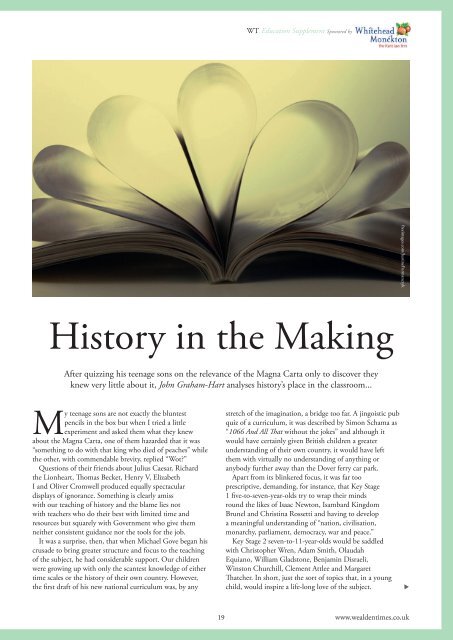Wealden Times | WT163 | September 2015 | Education supplement inside
Wealden Times - The lifestyle magazine for the Weald
Wealden Times - The lifestyle magazine for the Weald
Create successful ePaper yourself
Turn your PDF publications into a flip-book with our unique Google optimized e-Paper software.
WT <strong>Education</strong> Supplement Sponsored by<br />
freeimages.com/JustineFurmanczyk<br />
History in the Making<br />
After quizzing his teenage sons on the relevance of the Magna Carta only to discover they<br />
knew very little about it, John Graham-Hart analyses history’s place in the classroom...<br />
My teenage sons are not exactly the bluntest<br />
pencils in the box but when I tried a little<br />
experiment and asked them what they knew<br />
about the Magna Carta, one of them hazarded that it was<br />
“something to do with that king who died of peaches” while<br />
the other, with commendable brevity, replied “Wot?”<br />
Questions of their friends about Julius Caesar, Richard<br />
the Lionheart, Thomas Becket, Henry V, Elizabeth<br />
I and Oliver Cromwell produced equally spectacular<br />
displays of ignorance. Something is clearly amiss<br />
with our teaching of history and the blame lies not<br />
with teachers who do their best with limited time and<br />
resources but squarely with Government who give them<br />
neither consistent guidance nor the tools for the job.<br />
It was a surprise, then, that when Michael Gove began his<br />
crusade to bring greater structure and focus to the teaching<br />
of the subject, he had considerable support. Our children<br />
were growing up with only the scantest knowledge of either<br />
time scales or the history of their own country. However,<br />
the first draft of his new national curriculum was, by any<br />
stretch of the imagination, a bridge too far. A jingoistic pub<br />
quiz of a curriculum, it was described by Simon Schama as<br />
“1066 And All That without the jokes” and although it<br />
would have certainly given British children a greater<br />
understanding of their own country, it would have left<br />
them with virtually no understanding of anything or<br />
anybody further away than the Dover ferry car park.<br />
Apart from its blinkered focus, it was far too<br />
prescriptive, demanding, for instance, that Key Stage<br />
1 five-to-seven-year-olds try to wrap their minds<br />
round the likes of Isaac Newton, Isambard Kingdom<br />
Brunel and Christina Rossetti and having to develop<br />
a meaningful understanding of “nation, civilisation,<br />
monarchy, parliament, democracy, war and peace.”<br />
Key Stage 2 seven-to-11-year-olds would be saddled<br />
with Christopher Wren, Adam Smith, Olaudah<br />
Equiano, William Gladstone, Benjamin Disraeli,<br />
Winston Churchill, Clement Attlee and Margaret<br />
Thatcher. In short, just the sort of topics that, in a young<br />
child, would inspire a life-long love of the subject.<br />
<br />
19 www.wealdentimes.co.uk


















